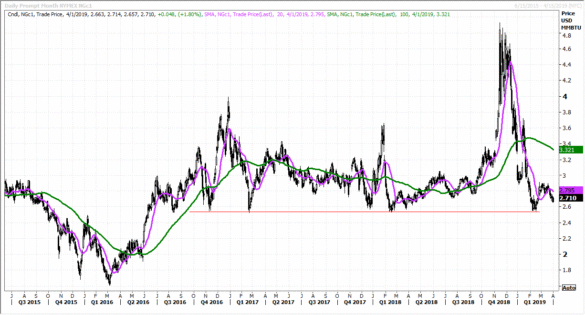Are Gas Prices Expected to Rise? A Look at the Future of Oil & Gas in a Changing Political Landscape
3 min readA recent Wall Street Journal article titled “Shale Companies, Adding Ever More Wells, Threaten Future of U.S. Oil Boom“ got me thinking that there may be a very subtle structural shift in oil and gas production occurring.
The article in summary says that expectations for even more aggressive returns based upon production may be ending. This combined with the Green New Deal and votes to ban or limit fracking in specific states may be signaling the end of almost unbounded growth of production on the oil and gas side. Plus, energy production executives are starting to be critiqued on cash flow and profits rather than production, which could also spell the end of growth.
Maybe I am daydreaming, but could we get a price pop if production scales back and if demand grows? In fact, we expect demand to grow in the next five years by about 10 Bcf of gas a day. The growth may come from liquefied natural gas (LNG) exports, Mexican exports, demand for gas generation and industrial demand, to name a few. If production doesn’t grow to meet demand, we could have a structural rally, which is a fundamental-driven shift higher in prices due to growth in supply falling below growth in demand. This may be a small possibility, of course, but think about the possibility.
Clean Energy & its Impact on Oil and Gas Production
Clean energy also plays a major role in impacting oil and gas production. For example, in the news lately, we’ve seen that banks and the government may be less likely to make dollars available for oil and gas due to increased interest in clean energy. There are always private equity firms, but they demand larger returns.
Then the political landscape may be changing. For example, Colorado is the state getting attention on restricting locations of oil and gas drilling but look at what Texas is proposing: an eminent domain bill — CSSB 421. The bill could delay oil and natural gas pipeline construction, which could drastically increase the cost of heating and cooling Texas homes, schools and businesses and make it more difficult to deliver fuel in the event of natural disasters, the Texas Oil and Gas Association comments in a press release.1
The bill moved out of Senate committee with a vote of 8-0 but must still pass the full Senate. But what is surprising about this bill is that Texas is known as a home to many oil and gas businesses in the United States and a state that has been more permissive than most with oil and gas development, yet even they might be in the midst of changing their energy landscape.
There is also an increased political opposition to new-build gas pipelines, such as the Atlantic Coast Pipeline in Virginia, the PennEast Pipeline in New Jersey or the Constitution Pipeline in New York. This could limit the growth of gas production in the future as constrained gas would lower the rate of return producers could earn.
Could $2.60 Bcf/day for gas in the forwards be the new low? Is it time to buy long-dated natural gas (e.g., buying gas for future terms, such as 2020)?
NYMEX has found “technical” support (more buyers than sellers) since Q4 2016 at ~$2.55/MMBtu (the red line)

Source: NYMEX
The changing political landscape may have the potential to impact the prices of oil and gas in the future.
If you want to protect your business from typical price volatility, it may be time to change the way you purchase your natural gas. By diversifying your purchasing strategy and making smaller purchases over time, you can minimize risk and increase your budget certainty.
Learn how Constellation can help you take advantage of this kind of diversified purchasing strategy through our SmartPortfolio program.
Guest Author: Ed Fortunato, Managing Director – Fundamental Analysis
Ed Fortunato is the Managing Director of Fundamental Analysis at Constellation, an Exelon Company and responsible for providing fundamental views of the economy, oil and natural gas. Ed has spent more than 15 years with Exelon having begun his career managing the proprietary trading book, the short-term analytics group and has lead the implementation of trading strategies in both the prop and hedging books since his arrival. Ed has an MBA with high honors in finance from Boston University and a BBA from Baruch College.
Reference

